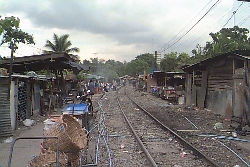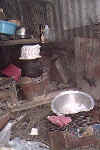 Wherever we live, Bangkok or
Indianapolis, there are the poor. Often they are invisible because we ignore
them. One can learn a lot with a visit to the "other half."
Wherever we live, Bangkok or
Indianapolis, there are the poor. Often they are invisible because we ignore
them. One can learn a lot with a visit to the "other half."The Other Half--Lessons on How to Live
 Wherever we live, Bangkok or
Indianapolis, there are the poor. Often they are invisible because we ignore
them. One can learn a lot with a visit to the "other half."
Wherever we live, Bangkok or
Indianapolis, there are the poor. Often they are invisible because we ignore
them. One can learn a lot with a visit to the "other half."
I skewered the hunk of pork with the wooden probe and popped the lot into my mouth. I chewed and immediately encountered something rock hard. I surrepticiously spat the mess into my hand, thinking I had broken a tooth. Sure enough, two enamels stared up at me, but they weren't mine--they were the pig's! I realized I was eating the critter's gums, teeth and all. Although I eschewed any more swine gum, I took the incident in stride. After all, that day I had already downed pig snout, struggled with pieces of pig's ears and, I think I even ate some of his brains, but I didn't ask about that.
An Isan friend of mine, now
living in Bangkok, had invited me to a small party being thrown at his aunt and
uncle's tin and clapboard shack in a slum (my friend's word) literally a spit
from a busy railroad track. The party was in honor of the uncle's daughter, Eun,
who was leaving the next day for home in Thoom Phom (a village in Nombualamphu
Province) where she would enter the 7th Grade. 
It was my second trip to the home and a further lesson on how the "other half" (more like two-thirds) live, away from the exotic glitter of Bangkok.
My friend's uncle, Chin, is living with his sister and her 20-year old son, Sing in a 25 square meter cardboard and clapboard structure with a corrugated metal roof. The room sits at the end of a path that winds its way through the rabbit warren of identical homes sitting alongside and between two railway lines. The cubicles are jammed against each other along both sides of the right-of-way. Every few minutes, day and night, commuter trains rattle by and diesel freights snort, belch and fart like bulls who've eaten beans--all totally ignored by the slum's inhabitants.
Some of the shacks double as convenience stores, selling sodas, beer, ice, sweets and other necessity items. I saw one little girl purchase a single egg and a small back of salt. For major food stuffs, one must negotiate two or three major crosswalks (the area is also adjacent to major thoroughfares and the entrance to the expressway) to an open market where chicken and pork sit baking in the Bangkok heat and smog.
 Our day was spent with the kids
playing a card game based on Baccarat outside the room on the narrow,
roughly-planked walkway. Above them, mangy beach-style umbrellas and plywood and
corrugated metal overhangs protected everyone from the sun and occasional
spatters of rain. (Another aunt lives three doors away with her two absolutely
gorgeous fatherless girls of 10 and five). Women slept Sing read.
Our day was spent with the kids
playing a card game based on Baccarat outside the room on the narrow,
roughly-planked walkway. Above them, mangy beach-style umbrellas and plywood and
corrugated metal overhangs protected everyone from the sun and occasional
spatters of rain. (Another aunt lives three doors away with her two absolutely
gorgeous fatherless girls of 10 and five). Women slept Sing read.
 Eventually, Chin left and
returned from the market with the pig's head--a real treat. While trains roared
by on the other side of a corrugated metal divider, he removed the cheeks and
carved flesh off the nose. I don't know if he did anything to the inside of the
head. Cheeks and ears were grilled, while the rest of the skull was covered with
a plastic bag and placed in boiling water. Cooking is done beside the room in a
small space just off the walkway. A three kilo bag of charcoal cost 12 baht
(about 28 cents U.S.).
Eventually, Chin left and
returned from the market with the pig's head--a real treat. While trains roared
by on the other side of a corrugated metal divider, he removed the cheeks and
carved flesh off the nose. I don't know if he did anything to the inside of the
head. Cheeks and ears were grilled, while the rest of the skull was covered with
a plastic bag and placed in boiling water. Cooking is done beside the room in a
small space just off the walkway. A three kilo bag of charcoal cost 12 baht
(about 28 cents U.S.).
The children moved inside to keep
out of the way of the adults and continued to play on the floor covered with
discarded linoleum. Eun carefully kept her money hidden under a towel. A 12-inch
fan was turned on and took the edge off the heat. The only other appliance was a
12-inch black and white TV that could pick up two stations on a good day. The
flimsy walls were covered with clothes hanging from nails, and the single small
futon used for sleeping. A newly purchased portable closet with sides of plastic
sheeting had just been installed. There was no furniture. 
Food began to arrive: A salad of peanuts and cabbage; various pig parts accompanied by two sauces and a papaya salad for me that was not hot. Relatives and friends had also congregated and joined in the consumption. Men ate inside on the floor, while the women and young children stayed out on the walkway. I gave my friend some more baht and he returned with more Chang beer and some Lao Tiger whiskey--a syrupy concoction that the Thais toss back in shot glasses. I tried a little to everyone's amusement, then stuck to beer. To me, it wasn't as tasty as the Tequila-like Lao Khao whiskey.
Chin works in the city, making maybe 70 or 80 baht a day. Prices to work the rented farmland at home have sky-rocketed, forcing many to leave home to find work. (My friend's parents are now working construction in Hat Yai for 90 baht per day). After taking Eun home on the 12-hour bus ride so she can begin school, he will return to work in Bangkok. He wants to come back quickly, so he can have a birthday party for his older, recently-married daughter. Apparently, the party will be at my place. More on this later, I guess.
As I have seen in Mexico, the poverty is superceded by family closeness and love. Smiles abounded and the moment was enjoyed for the moment. As usual, for this Westerner, it was humbling.
There was a lot to be learned.
Return to Travel Page. Return to Home Page.
![]()
© 2003 Michael Williams. All Rights Reserved.
Email Webmaster: thaimexico@lycos.com
Last updated: April 16, 2003.